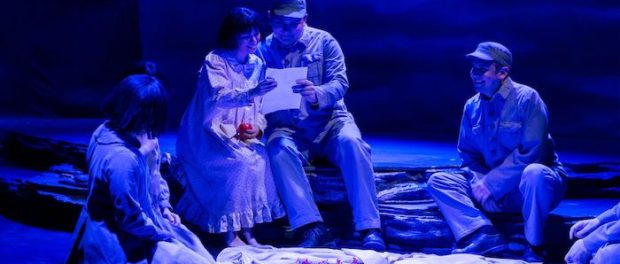Children of God: Too Many Untold Stories
Theatre Review
Before I venture into my review of Children of God, which is being staged at the Segal Centre for Performing Arts, I must confess that I fundamentally believe that there is no real intention, neither institutional nor political, to adequately recognize the history of genocide and colonization on the lands we refer to as Canada, particularly when it concerns Indigenous communities. Nor has there been anything done on a tangible and concrete level to make right the centuries of wrongs that have been perpetrated by English and French colonizers. This is not a forum to discuss the deep rooted inadequacies in the Canadian polity to address this issue, but given this understanding, I believe any discussion or artistic work that speaks to the issue of Residential Schools, which gained recognition only in the past few decades (with Residential Schools being run well into the ’90s), will be complex and extremely difficult to have.
Children of God brings to us a story of six young persons
(three boys and three girls), who have been placed in a Residential School, and
speaks to how their lives were imprinted by the experience, scarring them forever,
as they continue to face repercussions no matter how many frigid winters have
attempted to numb the pain of those horrific memories. I purposely omit a
summary of the actual piece, given that I believe that the story has to be experienced
and watched on stage and a mere summary thereof, would do it no justice.
Director Corey Payette and his entire team gets full credit for putting together a production that was built on a solid foundation of (overall) great actors and great production values, particularly the lighting, the music (in parts), and staging of the story. The choice of the musical genre to tell this story didn’t catch my attention right away, and easily till about thirty minutes into the performance I still saw the use of music clumsy and misplaced, but soon the narrative settled and just towards the end of the first act things fell right into place.

This is not an easy story to tell nor witness. There are stereotypes of what people believe happened in the Residential School system, but the witnessing of brainwashing children through daily lessons, shaming them for the use of their ‘devil tongue’, going through the pretence of the children writing to their parents, letters which never made it to their destinations, are all appropriately used in the piece. Particularly heart wrenching is the constant hope the children treasure, that one day they would escape this captivity and go home. There is also a peripheral exploration of a tender sibling relationship between the two protagonists Tom (played by Dillan Chiblow) and Julia (brilliantly played by Cheyenne Scott), which doesn’t see fruition, but manages to bring an essential humanity that they shared and found comfort in. Special shout-out Michelle St. John playing Rita, Tom and Julia’s mother. There is a unique emotional depth in her performance.
Now for the heavy discussion. I give full credit to Payette for the human stories he was able to weave into such a competent production, however oftentimes I felt that he was conscious of the audience he was speaking to. This obviously can both be a positive and a negative. For productions of this kind, where the audience is primarily non-Indigenous, the focus remains on the depiction of the horrors of the Residential School system, without really scratching the surface of where it stems from and what insidious cultural and human genocide means and has meant to the Indigenous peoples of Canada. I don’t pretend that this complex a topic can be discussed threadbare in every artistic production, for I believe it is a very difficult balance to strike: the first step is to bring people to a discussion with an even keeled approach, which is not accusatory, but more a re-telling of what transpired. I think Children of God does that and simply speaks to our humanity at every level and asks us to acknowledge what horrors there were. Second would be the steps we have to take to really tackle this, not just on a human level, but more the systemic one.

Being an artist of colour myself, I have always wondered how much of it is our responsibility to allow for the majority (or the historical oppressor) to be given the time and space to understand what any similar historical violence meant. For the most part I subscribe to this approach and I believe Children of God, including Payette, his team and everyone involved, did achieve with considerable success the re-counting of a snippet of an extremely painful, treacherous time in the history of our country. However, my fear is twofold: while acknowledgement and recognition of what happened is an essential first step, a generation of people can’t merely be offered sympathy as recompense for the generations they lost. Second, we shouldn’t cloud the process of recognizing a horrific event in our history with responding to either majoritarian guilt or presenting a palatable version of the truth to make it just that. Both of these merely contribute to the perpetuation of what was and is fundamentally anti-human.
Children of God is running at the Segal Centre for the Performing Arts till February 10, 2019. For tickets: https://www.segalcentre.org/en/shows/2018-2019/children-of-god
nb: more than a hundred Indigenous communities across Canada still have no access to regular clean drinking water. And there is no national policy framework that addresses this problem.






